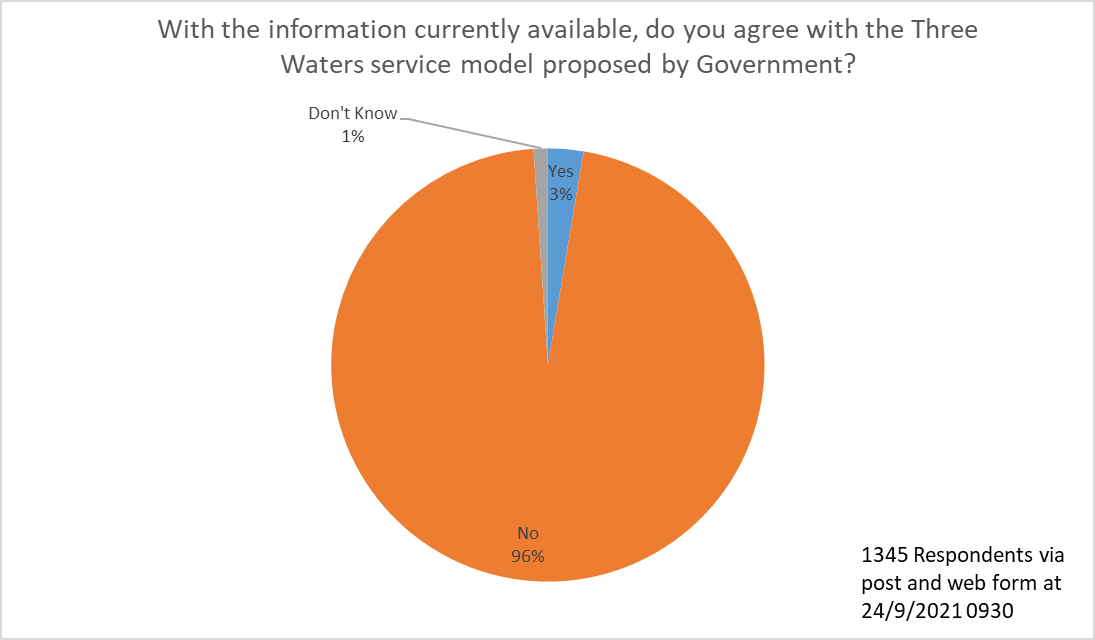Published: 24 Sep 2021
Two new reports received by Timaru District Council show that case for Three Waters Reform isn’t as compelling as the Government claims, and a significant majority of the community polled also aren’t convinced.
Councillors considering their official response to the Government’s Three Waters Reform programme are being presented with two Council-commissioned reports from global infrastructure consultants Castalia and New Zealand management consultants Morrison Low, as well as results from an informal poll of residents.
The reports cast doubt on the efficiency and cost savings claimed in the Water Industry Commission for Scotland (WICS) reports underpinning the Government’s model, while the poll shows 95% of respondents are against the reforms.
Timaru District Mayor Nigel Bowen said that despite the Government dismissing the Whangarei Castalia report out of hand when read in conjunction with the analysis from Morrison Low it cast serious doubt on the benefits of the proposals.
“We now have two reports casting serious doubt on the proposals and an extremely clear signal from the community that the loss of local control in the three waters space is not something they welcome,” he said.
“In considering our submission to Government these are issues that we can’t simply ignore, and we would expect in turn for the Minister for Local Government to take both our and the concerns of our community seriously.
“This is not to say that we don’t welcome regulatory reform. The introduction of Taumata Arowai is a positive development that will ensure local government walks the talk when it comes to provision of safe drinking water, and environmentally sound wastewater and storm water management.
“However, I feel that local government should be empowered to work collaboratively with Government on systems that can do the job, while keeping the strengths of localism, responsiveness and representation missing from the current proposal.
“With the likelihood of the majority of feedback from councils being against the plan I sincerely hope the Minister decides to work with the sector to create an effective Plan B, rather than forcing through this heavy handed, critically-flawed and massively unpopular reform plan.”
The report from Castalia says that: the WICS Reform Scenario is based on faulty assumptions and flawed analysis. The government has not shown with sufficient certainty to TDC that the claimed benefits of the Reform Scenario will materialise.
It claims that: WICS’ modelling makes implausible assumptions about the efficiency in the Reform Scenario. The government assumes that the Reform Scenario will deliver 50 percent capital expenditure (capex) savings and 53.3 percent operating expenditure (opex) savings.
The capex saving is not grounded in any actual evidence, but rather on WICS’ observations.
“The modelling presented by WICS shows an extremely optimistic view of the Government’s reform scenario and an extremely pessimistic view of Council work, it’s simply not a fair comparison,” said Bowen.
“The claimed efficiency gains following the Scottish reform in 2002, also suggests that councils haven’t been working to innovate and improve efficiency in parallel to Scotland over the past twenty years, nor would we continue to innovate.
“Our concern is that for many councils, us included, many of the efficiencies that the Government is touting they will deliver have already been realised by the sector, and some of the others such as increasing interconnectedness seem implausible.
“It’s easy to achieve operational efficiencies when the majority of your population lives in a corridor similar in distance from here to Oamaru, that benefit isn’t so clear for our community.”
The Morrison Low review of the council dashboards released by the Department of Internal Affairs shows that the future costs to council have been overstated by around 20%, and that many of the assumptions around asset renewals may have also resulted in an overstatement of debt and revenue projections.
It says: Investment is the single biggest driver of cost in the WICS model. It is what drives the future borrowing requirement, which in turn determines the amount of revenue that needs to be collected. That means that if the future investment requirements in the WICS modelling are under or overstated the future household costs are likely to be similarly impacted.
An informal survey of Timaru District residents via post and online was undertaken over the past few weeks. Of the 1345 responses, 96% of those said that with the information currently available, they did not agree with the Three Waters service model proposed by Government.
“From feedback to us, and similar exercises by other councils, it’s becoming increasingly evident that it would be difficult for the Government to claim widespread public support for this proposal,” said Bowen.
“I think that now is the time for the Government to take a pause and work in collaboration with its stakeholders, the people who have been running water services in New Zealand for more than 100 years, rather relying on a model based on what are increasingly faulty looking assumptions.”
The Castalia and Morrison Low reports are available for public access at https://www.timaru.govt.nz/services/environment/3-waters-reform/background-information.
The Council will meet to consider its submission to the Government on Tuesday 28 September at 3pm. Under COVID Alert Level 2 capacity in the council chamber is significantly reduced. The council is currently investigating livestreaming options.

Last updated: 24 Sep 2021